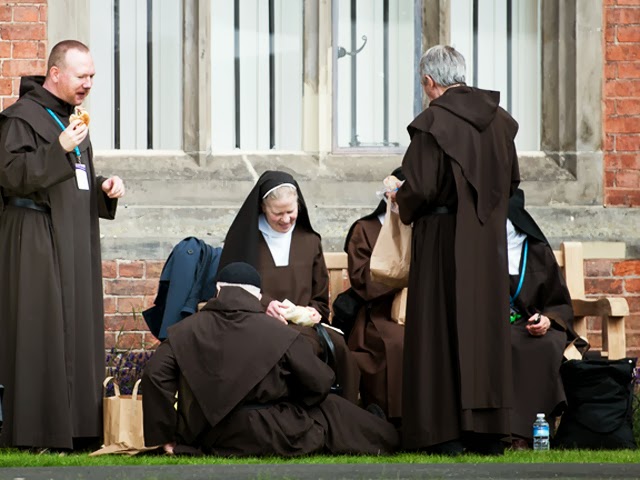I fall into a trap when it comes to this sort of prayer. Something will catch my eye as being a matter of concern to bring to God, and I will instinctively think of praying for the situation. For instance, I might see a homeless person on the street, or see a car crash that looks nasty, or a build up of armed police officers that signal a dangerous situation. Whatever the case may be, one jumps into prayer mode.
This prayer for others is known as intercessory prayer, and Jesus speaks quite frequently of its importance, for your friends, "your enemies and...those who persecute you" (cf. Mt. 5:44). In light of this, I decided to pray also for anyone who annoyed or perturbed me, in part because of this directive but also because praying for someone else has a profoundly humanising effect. One does not pray for objects, one prays for persons.
I have found that, instead of humanising others like I intended, what often happened is that I perceived myself to be exerting a certain power over others, and hence making objects of them once more. Not that prayer is an exertion of power per se, and it is important to clarify our theology of prayer to make this evident within a framework in which prayer is still efficacious, but that was none the less my experience: insofar as I consider prayer to be effective, praying for others was twisted into self-exaltation, as I elevate myself into a position where I bless others. In other words, if I pray for someone who is doing something wrong, I prayed from a status of exalted moral virtue, or if I pray for a poor person, I prayed from an exaltation of spiritual wealth. In short, my prayer was an expression of self-exaltation and and exercise of power over others, a power that I had because I was praying for them.
This attitude is, I think, highly problematic. It colours not only my interactions with the persons I pray for, but even my perceptions of the more distant situations I pray for. Like giving money to some poor person - which can also be an expression of dominance, a clarification that "I am richer and you are poorer" - praying for someone in this way is just a matter of self-righteous pride and contrary to the beatitude "blessed are the poor in spirit." The poor in spirit cannot dish out these blessings upon others like some people babble words of prayer: "I pray for this, and this, and that, and..ah yes, that one, and him, and those people, and definitely her....hmmm...and that too. Amen." because they have no blessing to give.
What then is the right way to experience intercessory prayer? I think that if intercessory prayer is to be genuine and avoid this pitfall of self-exaltation, it must begin with poverty of spirit. The first step is to recognise that we cannot bless others, that our prayers are simply petitions, we ask God for this or that. Being keenly aware of this fact is the right step towards avoiding the spiritual pride that can come with praying for others, since we become conscious that we are doing nothing for the situation or person other than presenting it to God.
Yet there is a more important step than this mere recognition of fact. I contend that intercessory prayer is a prayer made from the poverty of the other being prayed for. In this petitionary prayer, we enter into the other's needs, not insofar as they affect us, but from within their otherness. I think on this point we can learn from the experience of parents: a good mother, for instance, will not see their own needs, wants, desires and sufferings and those of her children to be particularly separate. If I were to break my arm, I have no doubt that my dad would feel the pain just as much as I would, if not more. Similarly, Jesus makes this link between his hungry brothers and himself in that famous line in the Gospel according to St Matthew when he says "as you did to the least of these my brothers, you did it to me." For a mother, the needs of her children are her own. For Jesus, the hunger of his brothers and sisters is his own. When we pray for another, their needs should be our own.
Hence, I have learnt, and am slowly learning, to shift intercessory prayer from a mode of power to a mode of poverty. For as I pray for the poor man, I do not pray as someone foreign to him, but I go to his side and pray for him as if for myself. I make his poverty mine and plead to God for him.
If I can make a practical aside for the celebration of the Mass, which as the highest prayer of the Church certainly includes intercessory prayer, the posture of "I stand, not as myself, but for them for whom I pray" is best displayed in Ad Orientum celebration of Mass. The priest acts in the person of Christ as he intercedes to God the Father in the name of Jesus, bringing to God our petitions as our head (for Christ is the head of his Body, the Church), and so it makes most sense to pray in the same direction as the people. A lawyer interceding for the defendant will not speak to the judge facing the defendant, but will look with the defendant towards the judge as the case is pleaded. Likewise, our representative Jesus Christ, in the person of the priest, looks towards God and offers to him our petitions.





